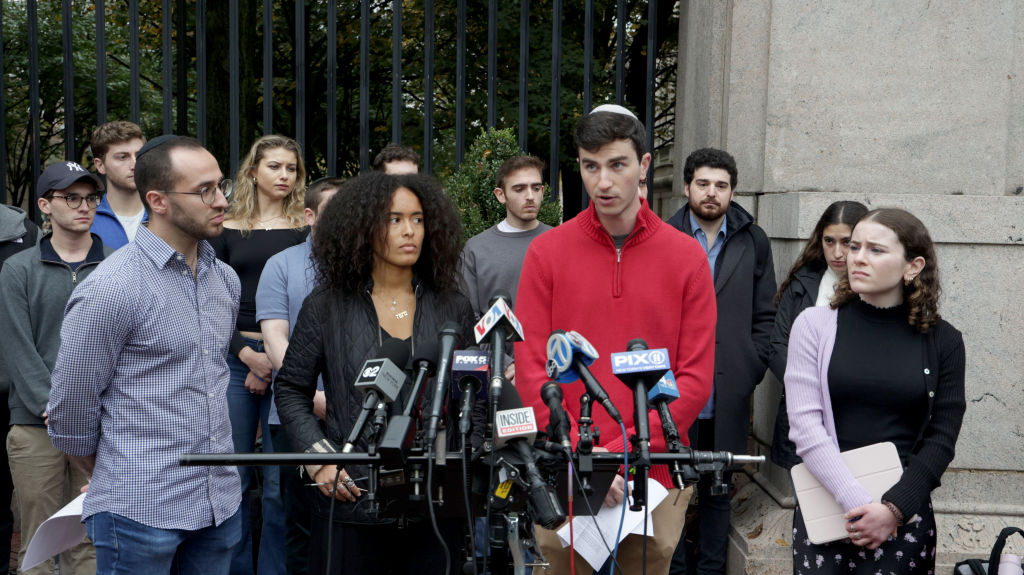[time-brightcove not-tgx=”true”]
My grandfather was from Germany, and he often shared stories with me about his beautiful town, Magdeburg, and what a tolerant place Germany was for Jews and its citizens—until one day it wasn’t. My wife and her family are from Iran, and she often says how Iran was a wonderful place for Jews—until one day it wasn’t.
I don’t want to tell my future grandchildren that America was a flourishing home for Jews until one day—October 7, 2023—it wasn’t.
After deep hate-fueled tragedies in recent years, like the murder of George Floyd, the Pulse nightclub massacre, the assault of Asian-Americans on our city streets, and the call for a Muslim ban, there was collective outrage. People from all walks of life locked arms and made it known that this extremism won’t be tolerated.
In contrast, in the days following the brutal massacre of more than 1,200 men, women, and children in Israel, the worst violence committed against the Jewish people since the Holocaust, there was a noticeable silence. And now, we have an emboldened “movement” of people taking to the streets and campuses from coast to coast cheering on the Hamas terrorists, calling for the elimination of the Jewish state, and expressing outrage that Israel should want to do what the U.S., France, Britain, and other countries did when faced with a terrorist organization dedicated to killing its people—that is, eliminate the threat.
We are experiencing a moral failure of our supposed friends and our so-called leaders. With some notable and appreciated exceptions, overall, standing up against hate is not as clear cut when it’s targeting Jews. What is driving this is nothing but old-fashioned antisemitism.
Fueling it is a moral relativism that has seized much of our media, captured our universities, and overtaken so many pillars of our society. Even our most prestigious institutions seem incapable of calling out antisemitism with the same clarity and conviction that they bring to nearly every other social issue, conceivable grievance, and perceived microaggression.
Or if they do condemn specific antisemitic acts, they often feel the need to add in a list of other forms of bigotry that they condemn at the same time. For example, the Stanford University President’s initial statement on Israel, which didn’t even mention terrorism and his follow-up statement which barely called out the growing antisemitism on the campus. By doing so, it reveals they don’t believe antisemitism is valid enough to condemn on its own. It sends the message, in the words of the British comedian and commentator David Baddiel, that “Jews don’t count.”
Or take the glee in which people seem to have as they tear down the ‘KIDNAPPED’ posters publicizing those who have been abducted by Hamas. It shows how far people have fallen in their dehumanization of Jews—from grandmothers to babies—they don’t see them as victims of a horrific war crime.
Read More: It’s Not Easy Being Jewish on American Campuses Today
Today, too many see it as trendy to root against the Jewish state and stand with the terrorist group Hamas. Too many believe this is the cause du jour and are happily hopping on board, chanting slogans that may sound catchy, but are in fact deeply antisemitic.
What they don’t appreciate is that their embrace of this rhetoric actually emboldens violent actors. In France, a Jewish woman was stabbed and a swastika graffitied on her door. In Los Angeles, a Jewish man was killed at a protest. In fact, ADL’s latest data tracked a total of 832 antisemitic incidents in the U.S. during the one-month period following the Oct. 7 attack—a more than 315-percent increase in incidents of harassment, vandalism and assaults compared to the year prior, and an average of about 27 incidents per day. Globally, incidents of antisemitism are reaching new levels with an increase of 537 percent in the U.K. and an increase of 961 percent in Brazil.
Meanwhile, a new national survey found that in the wake of the Israel-Hamas war about 70 percent of Americans view antisemitism as a “growing problem,” a significant increase from 49 percent who felt that way in 2022. The ADL survey also found that 18 percent of Americans indicated they themselves had witnessed hatred of Jews manifested in their own communities, an increase from 13 percent in 2022.
From the halls of high schools to the campuses of our universities, from the streets of Brooklyn to the suburbs of Los Angeles, Jewish Americans feel under threat. It is inexcusable, and it must end.
That starts not with a cancel culture, but with a counsel culture. We need to engage and educate those who are naïve or misunderstand what is going on. In fact, this is part of our core mission at ADL to partner with schools, organizations, and communities to deliver anti-bias education.
But for those who glorify Hamas, celebrate the massacre of Jews, and continue to harass and intimidate, or for institutions that turn a blind eye or can’t bring themselves to clearly condemn antisemitism, we need a “consequence culture.” We must hold them accountable.
We must act because the Jewish experience teaches us that at some point the golden era can end. We don’t have the luxury to assume it’ll all work out.
It didn’t work out for my grandfather in Germany, or my father-in-law in Iran. America is different, and we must fight to make sure it continues to be.

